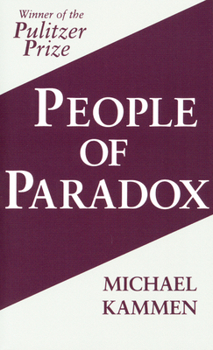People of Paradox: Deformity and Disability in the Graeco-Roman World
Select Format
Select Condition 
Book Overview
From the beginning, what has given our culture its distinctive texture, pattern, and thrust, according to Michael Kammen, is the dynamic interaction of the imported and the indigenous. He shows how, during the years of colonization, some ideas and institutions were transferred virtually intact from Britain, while, simultaneously, others were being transformed in the New World. As he unravels the tangled origins of our culture, he makes us see that...
Format:Paperback
Language:English
ISBN:0801497558
ISBN13:9780801497551
Release Date:August 1990
Publisher:Cornell University Press
Length:368 Pages
Weight:0.85 lbs.
Dimensions:0.9" x 5.0" x 8.0"
Age Range:18 years and up
Grade Range:Postsecondary and higher
Customer Reviews
3 ratings
Read the Last Chapter to Understand the American Experience
Published by Thriftbooks.com User , 15 years ago
Kammen is a brilliant historian and this work is, without doubt, one of the very best I've read about the American experience. The beginning chapters dig deep into the early colonial and pre-colonial history of the country. They may be difficult reading because of Kammen's academic style, and I've tended to skip over them. However, the last chapter is absolutely masterful, entitled "The Contrapuntal Civilization," as it describes the paradoxes of the American experience from the 1930's and afterward. The section on post-WW II America is sheer genius: the dualistic state of mind found in almost all aspects of politics and the collective American psyche. I've read and re-read this chapter so many times in an effort to understand what's become of this land, and its people. -Tom Maremaa, Author of the Forthcoming novel "Metal Heads" from Kunati Books in Spring 2009
A brilliant work
Published by Thriftbooks.com User , 21 years ago
When we train our students, we teach them to devour their elders. A deeply critical sensibility is part of the preparation of young scholars, and we only hope they gain perspective and humility as they grow more mature. As Kammen himself wrote in 1980, after telling the story of his father's reaction to this work (described in a student's review, below), "I am grateful for the reception this book has had and can only hope that it will continue to be read; critically, to be sure, but with compassionate acuity as well." There is humanity in that thought, and more than a little optimism too.This book is one of the great achievements of American history, written by one of the finest historians of his generation. It is not an easy book, both because Kammen writes in an idiosyncratic voice and because he presumes a deep learning on the part of his reader. As liberal arts education becomes increasingly debased in our public universities, fewer and fewer of our students have the intellectual resources to read a book like this one. That is a shame, because there is real wisdom here. This is a book that repays well the effort to reread it. You can gain a sense of Kammen at his most elegant from the final sentences of the introduction to part one: "Those of us who are historians, custodians of the past by definition, must try to recapture what Lionel Trilling once called 'the huge, unrecorded hum of implication,' because the life of the future is predicated upon the implication of the past. The historian is the memory of civilization. A civilization without memory ceases to be civilized. A civilization without history ceases to have identity. Without identity there is no purpose; without purpose a civilization will wither." (p. 13) His topic here, in all its messy and subtle glory, is American civilization. He seeks its origin in the peculiar circumstances of the colonial period, but make no mistake about his aim--his game is bigger than the Founding, as this quote suggests. I find his conclusion, in this day and age of post-modern cynicism, betokening an aspiration that few scholars seek today: "We should recognize, as Hawthorne did, the innocense as well as the evils of our natures. We should understand, as William James did, that Americanism is a volatile mixture of hopeful good and curable bad. We must maintain, as Carl Becker pleaded, a balance between freedom and responsibility. For freedom unrestrained by responsibility becomes mere license, while responsibility unchecked by freedom becomes arbitrary power." (p. 298) Few today have the courage, or learning, to write like that. It is a real tragedy when our best young minds cannot appreciate the deep reflection that rests behind a work like this one. But it is a greater tragedy that so few of our current custodians of the past can deploy the kind of mastery of our cultural humanism, in all its richness, that Kammen managed in 1972, thirty years ago. Maybe that is a mark of his greatness; one worries t
Paradox Americans
Published by Thriftbooks.com User , 23 years ago
I have died in Viet Nam But Ihave walked the face of the moonI have watched children starve from my golden towers. But I have fed half of the earthI am ashamed But I am proud. I am an American.




